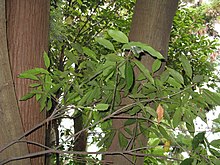Quercus acuta
| Japanese evergreen oak | |
|---|---|
 |
|
 |
|
| Scientific classification | |
| Kingdom: | Plantae |
| (unranked): | Angiosperms |
| (unranked): | Eudicots |
| (unranked): | Rosids |
| Order: | Fagales |
| Family: | Fagaceae |
| Genus: | Quercus |
| Subgenus: | Cyclobalanopsis |
| Species: | Q. acuta |
| Binomial name | |
|
Quercus acuta Thunb. 1784 not Buch.-Ham. ex Wall. 1829 nor Siebold ex Blume 1851 nor Raf. 1838 |
|
| Synonyms | |
|
List
|
|
Quercus acuta, the Japanese evergreen oak, is an oak native to Japan, South Korea, Taiwan, and China's Guizhou Province and Guangdong Province. Due to its foliage and habitat, it looks rather unlike most other oaks.
Quercus acuta is usually bushy and densely domed, reaching a height of 14 meters. The bark is smooth and dark grey. Leaves are dark and glossy above and yellowish beneath. They narrow to a long, finely-rounded tip. The flowers are on a stiff 5 cm catkin.
Often called Japanese white oak or shiro kashi, it is a standard choice for Japanese martial arts practice weapons such as bokken, because it has a uniformly tight grain structure due to its continuous growing season. It should not be confused with the oriental or Asian white oak, Quercus aliena.
...
Wikipedia
